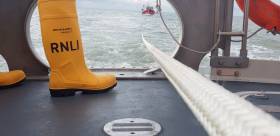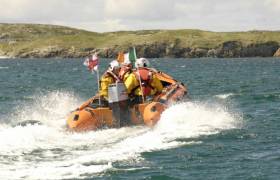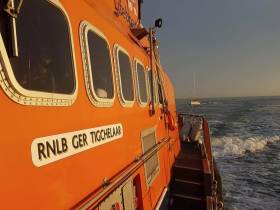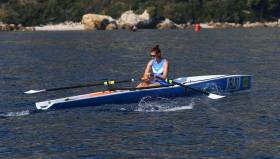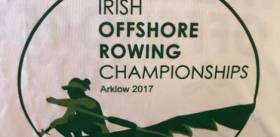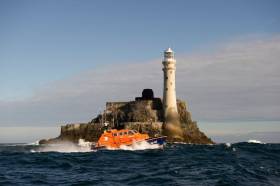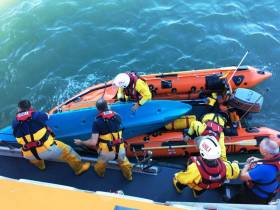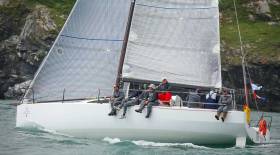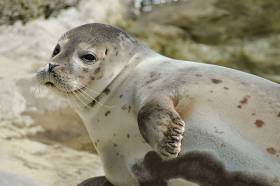Displaying items by tag: Arklow
Early Start For Arklow Lifeboat To Fishing Vessel In Difficulty
#RNLI - Following a pager alert by the Irish Coast Guard at 7.28am yesterday morning (Monday 27 August) Arklow RNLI’s all-weather lifeboat was launched to reports of a fishing vessel in difficulty.
Within a few minutes, the Ger Tigchelarr and her volunteer crew were en route to the casualty vessel some four miles south of Arklow.
Once on scene, the volunteer lifeboat crew were able to ascertain that the vessel had suffered machinery failure and needed assistance.
A tow line was set up and the vessel and its crew of three was towed back to Arklow where all hands came ashore safely.
Following the callout, Arklow RNLI community safety officer Mark Corcoran said: “Following these incidents, it’s important to stress to all who go on or in the water the importance of having a means of calling for help. The earlier our crews can get to the casualty, the better the outcome.”
Clifden Lifeboat Recovers Seven Cut Off By Tide
#RNLI - Clifden RNLI’s D class lifeboat Celia Mary was on exercise at Glassilaun Beach for the annual sports day on Sunday (12 August) when it was alerted to a group of people cut off by the tide.
The inshore lifeboat proceeded to Illamore Island after the alert at 3.50pm. On approaching the island, they saw a woman up to her chest in the water holding onto a child who was visibly in distress.
The six-year-old child was immediately brought onboard the lifeboat followed by her mother. Both were wet, cold, frightened and extremely happy to finally be in safe hands.
Both casualties were given survivors lifejackets and a crew member gave the child his warm helmet. Her mother had a jacket which she wrapped around her to keep the wind off.
The lifeboat crew spotted one more adult and four children stranded on top of some rocks. They were also cut off by the rising tide, but not in immediate danger.
The woman recovered to the lifeboat indicated that she was the mother of two of the children still on the rocks. The crew brought another child on board the lifeboat, placing a lifejacket and helmet on her.
After that the lifeboat proceeded to the beach where the crew collected the casualties’ belongings, leaving crew member David O’Reilly with the four still cut off by the tide.
The casualties on board the lifeboat were then returned to the safety of the shore, and went back for the remaining four. The callout was complete at 5pm and the lifeboat was ready for service from Clifden at 7pm.
Elsewhere, Arklow RNLI’s lifeboat was launched at 2.04pm yesterday (Monday 13 August) following a pager alert to a kitesurfer and windsurfer both reported to be in difficulty south of Mizen Head.
With strong tides in the area, Arklow RNLI proceeded to the scene. Upon arrival, the lifeboat crew were made aware that the casualties had made it ashore safely and the lifeboat was stood down.
Following the callout, Mark Corcoran, Arklow RNLI’s volunteer press officer and community safety officer, said: “Thanks to the quick thinking of the local beach lifeguard, our lifeboat was launched early enough to be on scene to assist if necessary.
“People should never hesitate in calling us out. Before going out people need to check the tides and weather and make themselves aware of local hazards and always carry a mean of calling for help.”
Arklow Lifeboat Rescues Lone Swimmer In Late Evening Callout
#RNLI#RNLI - Arklow RNLI’s all-weather lifeboat launched on Saturday evening (9 June) following a report of a lone swimmer in difficulty and being carried out to sea.
A concerned member of the public had been out walking at North Quay when they spotted the swimmer.
After alerting fishermen at the end of the North Pier, they called 999 an alerted the coastguard, who in turn tasked Arklow RNLI to launch at 10.22pm.
The lifeboat and her crew were underway and en route to the casualty within minutes. Some fishermen and others on the quayside maintained eye contact with the swimmer and were able to give the lifeboat volunteers assistance with location.
In rapidly darkening but calm conditions, the lifeboat crew located the casualty around a quarter mile south of Arklow Harbour, and were able to recover the now tiring swimmer using the rescue A-frame.
The casualty was brought ashore at Arklow lifeboat station and was handed over to the care of the waiting ambulance crew and gardaí. The swimmer was found to be in good spirits and was brought home a short time later.
“We would like to thank the member of the public and the fishermen who were out on North Quay last night,” said Mark Corcoran, community safety officer at Arklow RNLI. “Their early call for help allowed our volunteers to be able to make good time in getting to and recovering this casualty.
“We would like to encourage people to always remember to carry a means of calling for help and if they do spot anyone in the water who might be in difficulty to always call 999 or 112 and ask for coastguard.”
The RNLI recently launched its 2018 national drowning prevention campaign, Respect the Water, which is now in its fifth year of encouraging the public to fight their instincts upon contact with cold water and learn to FLOAT:
- Fight your instinct to panic or swim hard
- Lean back in the water to keep your airway clear
- Open your body up, extend your arms and legs, pushing your stomach up
- Actions: gently move your hands and feet to help you float
- Time: in 60-90 seconds you’ll be able to control your breathing
Arklow Lifeboat Assists Stricken Sailing Vessel With Two Aboard
#RNLI - Arklow RNLI was launched yesterday evening (Tuesday 17 October) following a call for assistance from the crew of a sailing vessel reporting mechanical failure.
The volunteer crew on board Arklow's all-weather lifeboat proceeded to the reported position approximately 12 miles south of Arklow in Co Wicklow. Weather conditions were calm and dry at the time, 24 hours after Storm Ophelia passed over Ireland.
Once the yacht had been located, it was decided to put a lifeboat crew member aboard the 10m sailing vessel to assist the crew of two.
Once a tow line was established, the vessel and her crew were towed back to Arklow where all came ashore safely.
Following the callout, Arklow RNLI volunteer press officer Mark Corcoran said: “Thanks to all of our volunteers on this shout who are always ready 24 hours a day to drop what they are doing in their own lives to go to sea to assist others.”
Dukarska Wins Heat at World Coastal Rowing Championships
#Rowing: Monika Dukarska won her heat at the World Coastal Rowing Championships in Thonon in France this morning. She qualified for Saturday’s A Final of the Coastal Women’s Solo. Two other Ireland competitors, Jessica Lee of Killorglin and Jeanne O’Gorman of Arklow, will compete in the B Final after placing 13th and 16th respectively.
The women’s coxed quadruple from Castletownbere finished ninth in their heat and made the A Final, while Cairndhu and Courtmacsherry will compete in a B Final. They finished 12th and 13th in their heat.
The Galley Flash men’s double of David Duggan and Mark O’Brien finished 11th in their heat and go to the B Final.
Dukarska is the defending champion in the women’s solo.
World Coastal Rowing Championships, Thonon, France, Day One (Selected Results; Irish interest)
Men
Double – Heats (First Seven to A Final; 8 to 13 to B Final) Heat Two: 11 Galley Flash.
Single – Heats (First Seven to A Final; 8 to 13 to B Final): Heat One: 6 Castletownbere (A Sullivan-Greene), 7 Arklow (J Casey). Heat Two: 10 Galley Flash (B Hooper). Heat Three: 7 Bantry (A Hurley); 8 Arklow (A Goodison)
Women
Quadruple, Coxed – Heats (First 10 to A Final; rest to B Final) Heat One: 12 Cairndhu, 13 Courtmacsherry. Heat Two: 9 Castletownbere; 13 Galley Flash.
Double – Heats (First 10 to A Final; rest to B Final) Heat One : 14 Arklow
Solo – Heats (First 10 to A Final; rest to B Final) Heat One: 1 Killorglin (M Dukarska) 20 min 44.83 sec; 13 Killorglin (J Lee); 16 Arklow (J O’Gorman). Heat Two: 10 Arklow (S Healy); 16 Arklow (V Annesley).
Casey and Dukarska Excel at Irish Offshore Championships
#Rowing: The titles at the Irish Offshore Championships were widely spread. Only the host club, Arklow, won twice, through their women’s double and John Casey in the offshore single. Casey, though he rows for Arklow and now lives nearby, is from Sneem. The quadruples went to Courtmacsherry (men) and Castletownbere (women), while New Ross won the men’s double. Killorglin woman Monika Dukarska, who will defend her world title in the offshore single next month in France, was dominant in the boat at Arklow. Conditions were testing, with a strong wind and rain squalls.
Irish Offshore Championships, Arklow (Selected Results; Winners)
Men
Sculling, Quadruple, coxed: Courtmacsherry 18:52.0.
Double: New Ross B 20:14.0.
Single: Arklow (Casey) 21:24.0
Women
Sculling, Quadruple, coxed: Castletownbere 26 min 42 sec.
Double: Arklow 22:27.0
Single: Killorglin (Dukarska) 21:59.0.
Baltimore Lifeboat Launches To Boat Aground In Heavy Fog
#RNLI - Baltimore RNLI launched in the early hours of yesterday morning (Thursday 17 August) after a boat ran aground in heavy fog near the West Cork village.
The volunteer lifeboat crew were paged at 00.39am to assist the 50ft vessel with three people on board. Sea conditions in the area were calm, but visibility was poor due to fog.
Under the command of coxswain Kieran Cotter and with mechanic Cathal Cottrell and crew members Pat Collins, Kieran Collins, Don O’Donovan, Jerry Smith and Micheal Cottrell, the lifeboat reached the vessel within 15 minutes.
After assessing the grounded boat’s situation and checking the surrounding area for any navigational hazards, a tow was established and the vessel was pulled clear.
There was no apparent damage to the vessel and no injuries to anyone on board, so it was allowed to move under its own power Baltimore Harbour, where it arrived escorted by the lifeboat at 1.20am.
Speaking following the callout, Baltimore RNLI volunteer lifeboat press officer Kate Callanan said: “With bad weather forecast for the next few days we would remind everyone taking to the sea to respect the water.”
Earlier in the week, Baltimore RNLI launched on Tuesday night (15 August) after reports of a flare sighted at Gokane Point, near Toe Head.
However, the lifeboat was stood down en route when the Irish Coast Guard learned that the flare was actually a firework set off from land and not a boat in distress.
Elsewhere, Arklow RNLI’s volunteers launched yesterday afternoon following a pager alert to a call for help from a sailing vessel with engine trouble.
In moderate seas, the lifeboat Ger Tigchlearr proceeded to the reported position of the casualty vessel, some four miles north east of Arklow Harbour and with two people on board.
Once on scene, the vessel and crew of the casualty vessel were found be in good order, and a towline was established it bring the boat back to Arklow.
John Tyrrell, Arklow RNLI’s lifeboat operations manager, commented: “Our crew were able to get the casualty vessel in a timely fashion. We would like to commend the skipper of the boat for calling for help at an early stage.”
#Rescue - The Arklow lifeboat joined Courtown RNLI and the Irish Coast Guard in a multi-agency rescue on Friday evening (11 August) after a teenage girl fell from an inflatable ‘doughnut’ being towed by a jet ski in Courtown Harbour.
Once on scene, around a mile east of Ardamine Beach south of Courtown, the Arklow lifeboat volunteers assisted their Courtown colleagued who were already in the water dealing with the casualty, a 13-year-old girl with suspected spinal injuries.
Arklow RNLI worked to clear the area of other vessels to allow for a safe airlift by the Waterford-based coastguard helicopter Rescue 117.
In the process, they picked up three other casualties — kayakers who had entered the water to assist in the rescue but found themselves adrift.
Independent.ie and The Irish Times have more on the story.
36 boats have entered the first ISORA offshore race to take place next Saturday. The offshore race will be approximately 60–miles, depending on the weather, starting in Holyhead and finishing in Dun Laoghaire. See attached ISORA entry list list below.
The fleet is a great cross section, from classic to high tech and from small to large, demonstrating the range of boats that are interested in racing offshore. The newly adopted “ISORA Progressive ECHO” will ensure a greater spread of prizes for the race with prizes for six classes and trophy for overall as well as the famous “Race Winners Jacket”, says ISORA's Peter Ryan.
The gathering of such a large numbers of boats and their crew in Holyhead on the Friday evening and again hopefully at the NYC on Saturday evening will generate a great social atmosphere, adds Ryan.
After Holyhead to Dun Laoghaire, the ISORA fleet gather again for a new offshore race to Arklow on May 27th. Read more on that new race here.
Seal Pup Treated For Suspected Stab Wounds
#MarineWildlife - The Wicklow People reports that a six-week-old common seal is being treated for suspected stab wounds after being found in “very shape” by people walking on Arklow’s South Beach yesterday morning (Friday 18 November).
The incident is the second in three weeks in the Arklow area to involve a seal with wounds thought to have been caused by human hands. More on this story HERE.



























